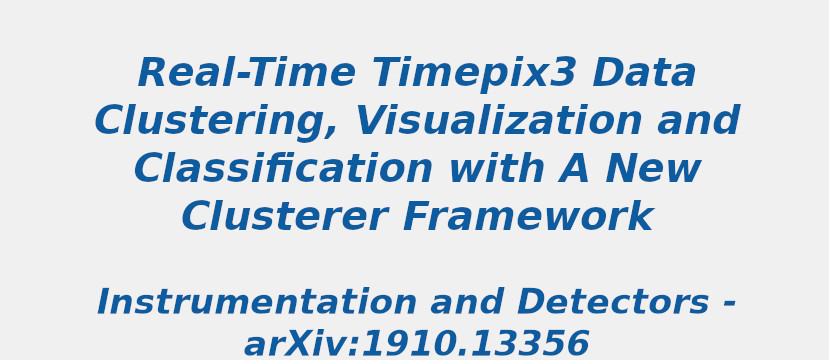Research Area: Machine Learning
With the next-generation Timepix3 hybrid pixel detector, new possibilities and challenges have arisen. The Timepix3 segments active sensor area of 1.98 cm2 into a square matrix of 256 x 256 pixels. In each pixel, the Time of Arrival (ToA, with a time binning of 1.56 ns) and Time over Threshold (ToT, energy) are measured simultaneously in a data-driven, i.e. self-triggered, read-out scheme. This contribution presents a framework for data acquisition, real-time clustering, visualization, classification and data saving. All of these tasks can be performed online, directly from multiple readouts through UDP protocol. Clusters are reconstructed on a pixel-by-pixel decision from the stream of not-necessarily chronologically sorted pixel data. To achieve quick spatial pixel-to-cluster matching, non-trivial data structures (quadtree) are utilized. Furthermore, parallelism (i.e multi-threaded architecture) is used to further improve the performance of the framework. Such real-time clustering offers the advantages of online filtering and classification of events. Versatility of the software is ensured by supporting all major operating systems (macOS, Windows and Linux) with both graphical and command-line interfaces. The performance of the real-time clustering and applied filtration methods are demonstrated using data from the Timepix3 network installed in the ATLAS and MoEDAL experiments at CERN.
Keywords:
Data clustering
Visualization
Classification
Timepix3
MoEDAL
Author(s) Name: Lukáš Meduna, Benedikt Bergmann, Petr Burian (1 and 2), Petr Mánek, Stanislav Pospíšil, Michal Suk
Journal name: Instrumentation and Detectors
Conferrence name:
Publisher name: arXiv:1910.13356
DOI: 10.48550/arXiv.1910.13356
Volume Information:
Paper Link: https://arxiv.org/abs/1910.13356
